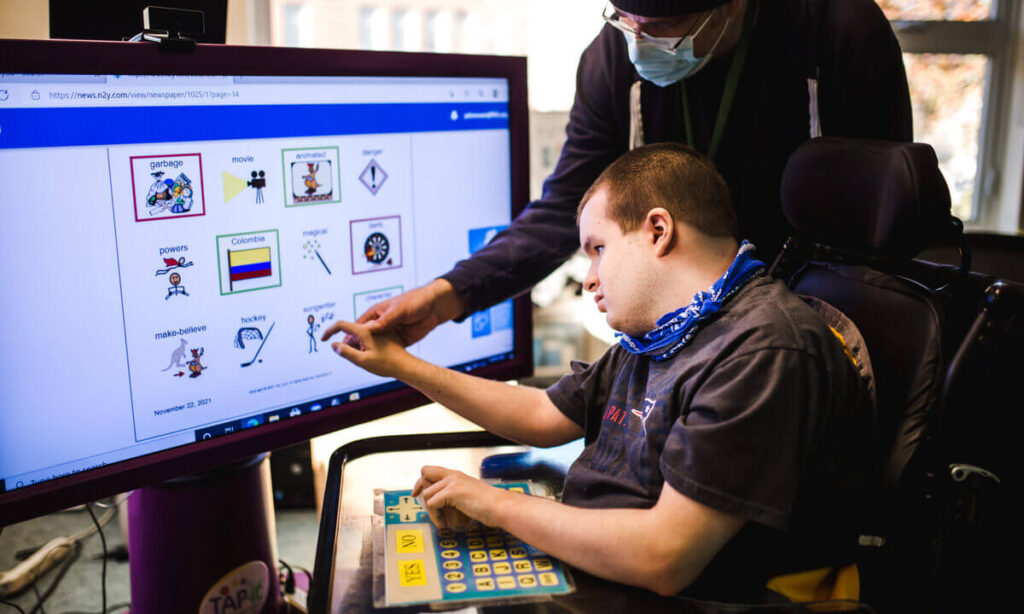Introduction to jobs that work with special needs
Being inclusive and having a diverse workforce is highly valued in today’s culture. There is a growing demand for occupations that are tailored to the needs of individuals with special needs. This is a result of employers’ increased awareness of providing individuals with special needs with an inclusive environment. Thus, the lives of those who have special needs are improved by these jobs. In addition to that, they provide profitable career chances for those who are interested in working in this field. In this article we will discuss the 10 highest-paying jobs that work with special needs. Plus, we also share the typical incomes, prerequisites, and job growth associated with each of these categories.
Importance of inclusivity in the workforce
Not only is it important to achieve diversity quotas in order to create an inclusive workforce, but it is also important to acknowledge the distinctive contributions that people with special needs bring to the table. Companies are able to tap into a pool of talent that possesses significant skills and views when they successfully integrate individuals with special needs into the workforce. Creating an inclusive work environment encourages creativity, ingenuity, and empathy, which ultimately results in improved problem-solving and decision-making responsibilities. When people with special needs are provided with equal opportunities they foster a sense of belonging and self-worth. This ultimately contributes to an improvement in their quality of life as a whole. It is vital for companies to embrace the concept of inclusion. This is to guarantee that people with special needs have access to work opportunities that are meaningful and rewarding.
Highest-paying jobs that work with special needs
Without further ado, here are the 10 highest-paying jobs that work with special needs. Keep reading to find out!
Job #1: Special Education Teacher

Average Salary: $62,950 per year
Requirements: A bachelor’s degree in special education or a related field, state certification or licensure
Job Growth: 0% (According to the Bureau of Labor Statistics)
Special education teachers play an important role in this job. They support students with disabilities such as learning difficulties, intellectual disabilities, and behavioral disorders. They construct individualized education programs, also known as IEPs. Additionally, they also use tailored educational approaches to adapt to the specific needs of each individual student. Lastly, they collaborate with parents, other educators, and support providers in the field to ensure their students’ academic and social success.
Job #2: Occupational Therapist

Average Salary: $93,180 per year
Requirements: A master’s degree in occupational therapy, state licensing
Job Growth: 12% (According to the Bureau of Labor Statistics)
Occupational therapists help those with physical, developmental, or emotional issues. They do so by enhance their independence and daily living skills by working with them. After completing an assessment of their clients’ capacities, they build tailored treatment programs. This is done to aid them in regaining or developing the skills required for day-to-day work. Additionally, occupational therapists can work in a variety of settings, including hospitals, schools, rehabilitation centers, and private practice.
Job #3: Speech-Language Pathologist

Average Salary: $84,140 per year
Requirements: A master’s degree in speech-language pathology, state licensing
Job Growth: 19% (According to the Bureau of Labor Statistics)
Next on the list of the highest-paying jobs that work with special needs is speech-language pathologists. Speech-language pathologists, or speech therapists, provide assistance to those who struggle with communication and swallowing issues. Speech and language disorders, such as articulation difficulties, fluency disorders, and voice disorders, are evaluated, diagnosed, and treated by these professionals. Rehabilitation facilities, schools, hospitals, and clinics are just some of the places where speech-language pathologists can be found working.
Job #4: Clinical Psychologist

Average Salary: $85,330 per year
Requirements: A doctoral degree in psychology, state licensure
Job Growth: 6% (According to the Bureau of Labor Statistics)
Clinical psychologists specialize in the assessment and treatment of mental, emotional, and behavioral disorders. They work with people of all ages, including those with special needs. This is part of their aim to improve people’s mental health and general quality of life. Clinical psychologists may provide therapy, conduct psychological exams, and establish complete treatment plans in partnership with other medical specialists.
Job #5: Rehabilitation Counselor

Average Salary: $39,990 per year
Requirements: A master’s degree in rehabilitation counseling, state licensure or certification
Job Growth: 2% (According to the Bureau of Labor Statistics)
Rehabilitation counselors aid people with disabilities in overcoming obstacles in their personal, social, and professional life. They aid their clients in the development of skills, the acquisition of jobs, and the construction of independent lives by providing counseling and coaching. Rehabilitation counselors operate in a variety of settings, including private practice, community centers, and vocational rehabilitation agencies.
Job #6: Behavior Analyst

Average Salary: $85,330 per year
Requirements: A master’s degree in applied behavior analysis, certification as a behavior analyst
Job Growth: 6% (According to the Bureau of Labor Statistics)
Behavior analysts are experts that specialize in evaluating and changing the patterns of behavior that people with special needs exhibit. The strategies they use are research-backed and are intended to enhance positive behaviors while decreasing problematic behaviors. Behavior analysts regularly engage with schools, parents, and other professionals as part of their practice to establish effective behavior intervention tactics. Educational institutions, clinics, and residential facilities are among the destinations.
Job #7: Special Needs Nurse

Average Salary: $81,220 per year
Requirements: A bachelor’s degree in nursing, state licensing
Job Growth: 6% (According to the Bureau of Labor Statistics)
Special needs nurses are nurses who specialize in providing care to people with disabilities or chronic illnesses. They may work in places such as hospitals, clinics, schools, or private households, in addition to providing care for those with complex medical requirements. They may also be in charge of administering medication, checking vital signs, and providing assistance. Special needs nurses play an important role in ensuring their patients’ health and well-being.
Job #8: Adaptive Physical Education Teacher

Average Salary: $51,330 per year
Requirements: A bachelor’s degree in physical education or a related field, state certification
Job Growth: 4% (According to the Bureau of Labor Statistics)
Adaptive physical education teachers are in charge of designing and implementing physical education programs for individual students with impairments. It is their obligation to modify activities and equipment to meet the individual needs and abilities of their students. Adaptive physical education teachers work in schools, rehabilitation centers, and community groups to help individuals with special needs to improve their motor skills and physical fitness.
Job #9: Assistive Technology Specialist

Average Salary: $52,611 per year
Requirements: A bachelor’s or master’s degree in assistive technology or a related field
Job Growth: 10% (According to zippia.com)
Next on the list of the highest-paying jobs that work with special needs is assistive technology specialists. Assistive technology specialists conduct exams, make decisions, and train persons with disabilities on how to use various assistive technologies and devices. They examine their customers’ specific needs and give recommendations for the best assistive technology solutions to improve their level of autonomy and overall quality of life. Assistive technology specialists work in educational institutions, rehabilitation centers, and hospitals, among other places.
Job #10: Vocational Rehabilitation Counselor

Average Salary: $39,990 per year
Requirements: A master’s degree in rehabilitation counseling, state licensure or certification
Job Growth: 2% (According to the Bureau of Labor Statistics)
Assisting people with impairments in securing and retaining meaningful employment is the primary focus of vocational rehabilitation counselors. In addition to providing vocational training, assistance with job placement, and ongoing support, they evaluate the talents, interests, and abilities of their customers. Individuals with disabilities are provided with equitable chances in the workforce through the collaborative efforts of vocational rehabilitation counselors and employers.
The Common Types of Disabilities
It is possible for people who have special needs to suffer from a broad variety of disabilities, including but not limited to the following:
- Intellectual disabilities: People who have intellectual disabilities are characterized by limits in their intellectual functioning as well as their ability to adjust to new situations. It is possible that they will require assistance in areas such as communication, practicing self-care, and social skills.
- Learning disabilities: A person’s capacity to acquire and make use of particular academic skills, such as reading, writing, or mathematics, might be negatively impacted by learning disabilities. When it comes to becoming successful in educational settings, individuals who have learning difficulties frequently require particular teaching and accommodations.
- Autism spectrum disorders: The social interaction, communication, and conduct of individuals with autism spectrum disorders are all impacted by these conditions. Those who have autism may struggle with social skills, sensory processing, and actions that are repeating of themselves.
- Physical disabilities: In addition to being caused by congenital disorders, accidents, or illnesses, physical limitations can also be the result of other factors. Mobility, coordination, and physical independence can all be negatively impacted by these disorders because of their impact.
- Sensory disabilities: Visual impairments, hearing impairments, and other sensory processing abnormalities are all examples of what are referred to as sensory disabilities! In order to facilitate access to information and full participation in their surroundings, individuals who have sensory disorders may require adaptations and accommodations.
Other Careers That Work With Special Needs
There are a variety of different vocations that involve working with people who have special needs, in addition to the jobs that are described above that typically offer the highest salaries. Included in this are:
- Physical therapists: Physical therapists are professionals that assist people with impairments in enhancing their mobility and physical function via the use of specialized exercises and therapies.
- Music therapists: Individuals who have special needs can benefit from music therapy because it allows them to address their physical, emotional, cognitive, and social needs through the use of music-based therapies.
- Art therapists: In order to facilitate self-expression, emotional healing, and personal development in individuals with special needs, art therapists employ a wide range of artistic practices.
- Assistive technology engineers: In the field of assistive technology engineering, these people are responsible for the design and development of assistive technologies and equipment. Their goal is to improve those with disabilities’ ability to enjoy freedom and accessibility.
- Social workers: Counselling, advocacy, and support services are provided by social workers to individuals with special needs and their families. Social workers are available to provide these services.
Conclusion on the highest-paying jobs that work with special needs
Working with people who have special needs can be a vocation that is not only satisfying and gratifying, but also provides prospects that can be financially financially successful. The highest-paying jobs that work with special needs are becoming increasingly sought after as the desire for inclusivity in the workforce continues to grow. Employers have the ability to draw into a pool of talent that brings a variety of views and capabilities to the table if they embrace inclusion and provide equitable opportunity. Working with people who have special needs enables professionals to make a good influence and contribute to the development of a society that is more inclusive. This involvement can take the form of education, therapy, counseling, or the use of technology.
Did you find this article interesting? If so, check out more articles on our website. Thanks for reading!
Note: The salaries mentioned in this article are approximate and may vary based on factors such as education, experience, and geographical location.






